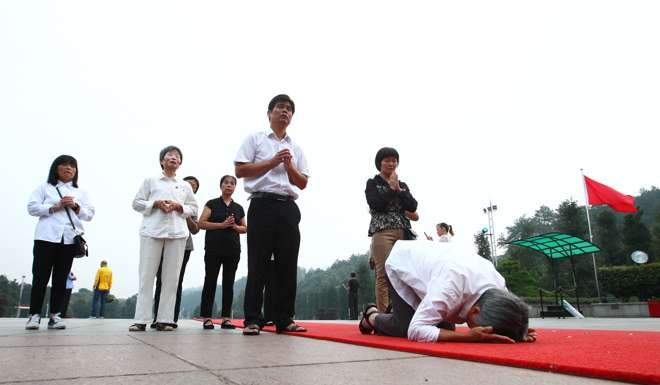
Wailing, singing and cigarette offerings: thousands pay tribute in Mao Zedong’s hometown on 40th anniversary of his death
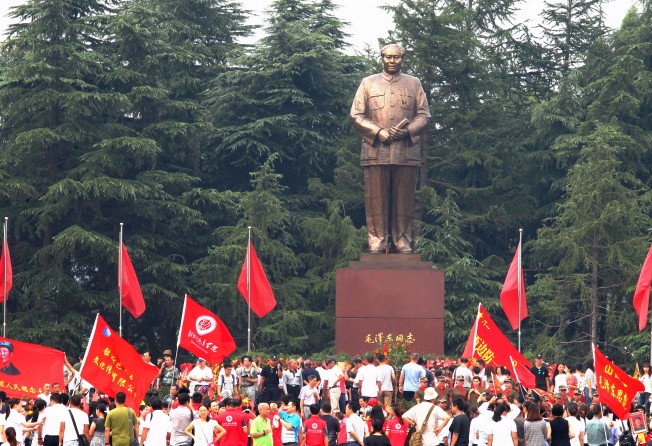
Tens of thousands of people flocked to the hometown of late leader Mao Zedong to commemorate the 40th anniversary of his death on Friday amid tight security.
In the main square of Shaoshan in Hunan province, where a bronze statue of Mao rises 10 metres into the air, supporters knelt down and recalled the “good old days”.
There was more equality and welfare back then, less corruption and stronger faith, they said. Their minds can accommodate the legacy of suffering that Mao caused, the tens of millions of deaths from famine and political persecution that occurred during his time in power.
“Your impressions of the Cultural Revolution are very different from ours,” said Gao Fei, 53, a veteran from Guangzhou in Guangdong province born three years after the decade-long political turmoil kicked off.
“For us, although people were poor and material life was difficult, people’s spiritual condition was good.
“Back then, we all had a certain degree of faith ... Now it is a complete mess. People have nothing to believe in, but money,” Gao said.

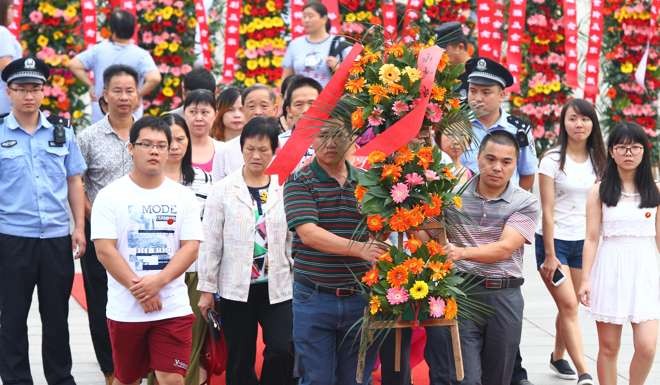
The commemoration started on Thursday night, with about four dozen people gathering in front of the statue.
At 10 minutes past midnight – the time when Mao reportedly died – the quiet of the night was broken by long wails and revolutionary songs erupting from a loudspeaker.
On September 9 last year it was all quiet, with few people here. They usually come on his birthday and around Lunar New Year
People approached the statue in turns, some laying wreaths, with others placing offerings of liquor and cigarettes while performing a traditional rite.
By morning, hundreds of security officers, including SWAT team members, roamed the square but there was little trouble, aside from a few overly loud chanters and people who lingered too long before the statue.
The owner of a noodle shop next to the square said she had never seen such a large crowd on the anniversary of Mao’s death in the decade she had had the business.
“On September 9 last year it was all quiet, with few people here. They usually come on his birthday and around Lunar New Year,” she said.
Even Buddhist monks and nuns came to bow before the former leader, finding common ground with the atheist Communist Party.
Others smiled as they posed for photographs with Mao impersonators who wandered among the crowd.
Chen Fangjiao, 71, from rural Zhejiang province, burst into tears as she knelt in front of Mao’s statue. “My family was extremely poor in the past. My six siblings and I used to beg on the streets when we were little,” she said.
“After Chairman Mao came into power, he confiscated the land from landlords and gave it to us. That was how my family survived.
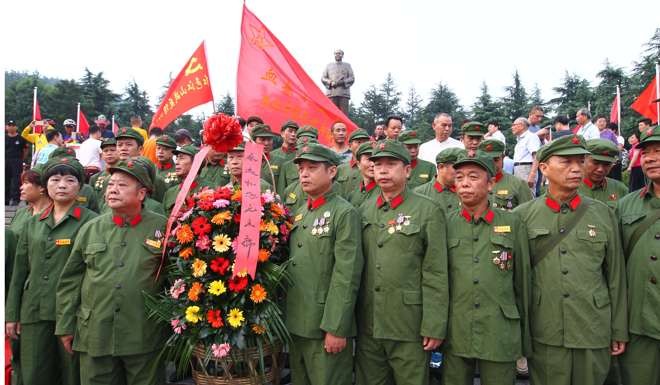
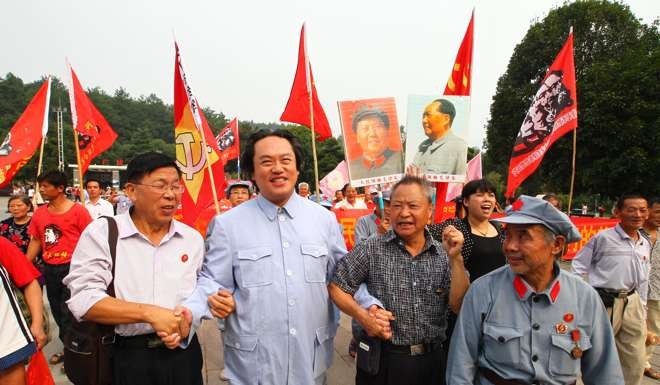
Mao ruled for 27 years and tens of millions of people died during the three-year Great Famine caused by his calamitous Great Leap Forward campaign, which began in the late 1950s.
Millions more intellectuals and critics were persecuted and tortured during the Cultural Revolution, which ended only with his death in 1976.
But the catastrophes were scarcely mentioned in the square. The people who came to mark the anniversary preferred to talk about a “better time” and one that might arrive again.
Maoists have in recent years been critical of policy formulated in Beijing, but a shift has taken place in certain quarters, with some speaking highly of President Xi Jinping.
Maoists in China resent the post-Mao market economy reforms masterminded by Deng Xiaoping, which introduced private ownership and foreign investment and eroded the old welfare state.
Despite of their grievances about the present, some Maoists see Xi as inheriting Mao’s mantle and on the path to realising Mao’s socialist ambitions.
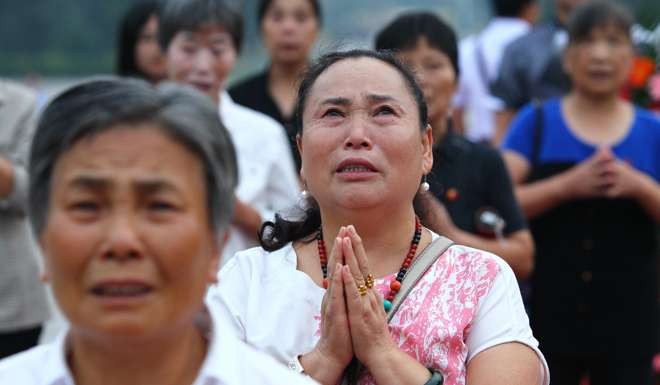
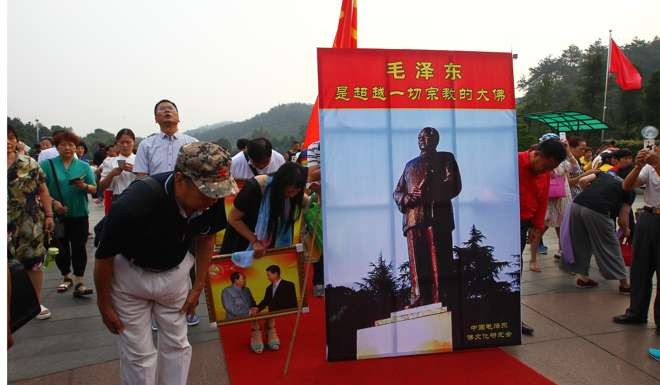
Some in the crowd held a framed print showing a smiling Mao holding Xi’s hand. The image was the work of Wang Chengxin, 59, a loyal Maoist from Beijing who has been in Shaoshan for four months to “preach Mao Zedong thought”. He called the piece “Inheritance across Space and Time”.
Xi Jinping has inherited Mao Zedong thought, the common folk all agree on that
“Xi Jinping has inherited Mao Zedong thought, the common folk all agree on that,” Wang said. “He cracks down on corruption, follows the mass line campaign and serves the poor. These are all in accordance with Mao Zedong Thought.
“Without social equality and justice, what is the use of developing the economy itself?”
Tang Digen, 65, from Loudi in Hunan, who took his 13-year-old grandson to pay respects to Mao, agreed.
“I think there are some similarities between Chairman Xi and Chairman Mao. Rural people like us all worshipped him in private,” Tang said, pointing to Xi’s efforts to alleviate poverty and raise rural livelihoods.
Zhang Tielin, a Maoist from Beijing, said there was hope that Xi could claw back some of the ground Mao Zedong Thought had lost in the past decades, but it might be difficult.
“Those who benefited from the reform and opening-up policies are huge consortiums and vested interests. China has strayed too far from the goal of common prosperity,” he said.